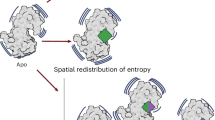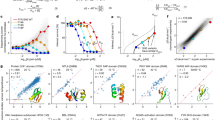Abstract
I propose a new method to calculate the entropy of a given protein sequence fragment. The set of fragment entropies over all possible fragments of the given sequence shows which region of the sequence is statistically stable and which region has a strong desire to fold into particular conformations. Here are three methods to calculate fragment entropy, the results from each of which represent entropies of different stage of protein folding.
Similar content being viewed by others
Article PDF
Author information
Authors and Affiliations
Corresponding author
Rights and permissions
About this article
Cite this article
Onizuka, K. Entropic Landscape: the method to predict folding patterns and regional stability of proteins. Nat Prec (2009). https://doi.org/10.1038/npre.2009.2972.1
Received:
Accepted:
Published:
DOI: https://doi.org/10.1038/npre.2009.2972.1



